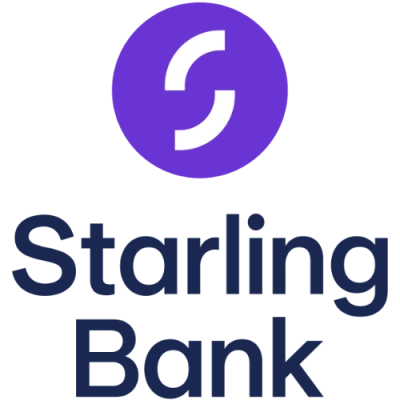A business bank account is one of the fundamental building blocks of your organisation. Choosing the right one can save you hundreds per year in banking fees as well as countless hours of administration.
In this article you’ll discover
Best Business Bank Accounts
Tide

per month
Starling Bank

per month
Virgin Bank

per month
Best Account For New Businesses

Pros
Cons
If you are a setting up a LTD company from scratch, Tide is certainly worth considering. They will guide you through the LTD company formation process and approval times are some of the quickest in the industry. Their charges aren’t the lowest available though and they don’t have a high street presence. If you want to pay in cash and cheques, you can do this via the Post Office, but will incur a charge.
Best Business Account For Low Fees

Pros
Cons
For day to day business banking, Starling are our overall top pick. There are no monthly account fees and won’t cost you anything to transfer funds in and out of your account electronically. It’s also free to withdraw your funds via an ATM and will integrate with accounting software like Xero, Quickbooks and Sage. They are an App only bank which means they don’t have a high street presence and you will pay a hefty fee to pay cash in via their post office service. If you mainly send and receive funds electronically, they are an excellent option.
Best High Street Business Account

Pros
Cons
If you are looking for a business bank that offers a high street presence, then you won’t get much better than the Virgin Money M account. It’s specifically geared towards new companies and sole traders. With no monthly account fees and no transaction and ATM charges, the M account is low cost, but big on features. They also offer a handy in app cheque scanning feature to save you time. Paying in and withdrawing cash is costly though and they do have manual credit and debit charges. You must also have a turnover below £1million.
Best Business Account For € and $

Pros
Cons
When it comes to dealing in multiple currencies Revolut are one of the best options available. If you know that you expect to receive lots of your revenue in Euros and dollars, then you could make substantial savings by opening a Revolut account. They have low exchange rates and you can hold multiple currencies too. Their free account is quite limited on features and their first paid plan costs £25 per month, but this can be more than offset if you are regularly receiving foreign currency. A big drawback is that Revolut are not FSCS protected, so if this worries you, it may be worth having them as a secondary account to exchange funds before transferring to your main business account.
What Will You Need to Set Up A Business Bank Account?

Setting up a business bank account is far easier than it used to be. Newer entrants have streamlined the account opening process meaning you can be up and running in minutes, rather than days or even weeks. At the bare minimum you will need to the following
- Valid photo ID – Passport, Drivers Licence
- Proof of address – Bank statement or Utility bill
- Your business details – Company Number, registered address, VAT details and expected yearly turnover
What Costs and Charges Can You Expect With a Business Bank Account?
Business banking is getting cheaper all the time. It wasn’t all that long ago that you would need to pay a monthly fee and transaction costs on top. Now you can expect almost free business banking from the likes of Starling Bank.

When comparing business bank accounts, be sure to look at the following
Standing Charges
The monthly fee for having an operational bank account. Many of the business bank accounts that we have listed have no standing charges
Transaction Charges
The price you pay per transaction. For example transferring money in and out of your business bank account, paying standing orders or direct debits and paying in or withdrawing cash, either over the counter or at an ATM.
Insufficient Funds Charge
If you try to make a payment without sufficient funds in your account you may be charged. Thankfully there are banks that don’t charge if a payment is refused.
Overdrafts
You will normally need to apply for an overdraft separately when you open your business bank account. There may also be an annual fee as well as interest charged on the amount you borrow.
Premium Additions
Whilst there are plenty of virtually free business bank accounts, many will offer premium services, for example Starling offer a business toolkit, that makes for faster invoicing and tax calculations. You may not want these initially, but they can be useful time savers as your business grows and you can afford it.
Internet Banking
Pretty much a given nowadays and we’d go as far to say it’s an essential requirement. Most business banks offer this for free, but there could be some cases where internet banking isn’t available or there is an additional charge, so always check when opening an account.
Cashback
Much like premium personal current accounts, some business bank accounts offer cashback on card purchases. A lot of business bank accounts offer this bundled in with their premium accounts which incur a monthly standing charge. You’ll want to consider if you will make the monthly charge back in cashback based on your card spend.
Best Features to Look For in a Business Bank Account
You want your business bank account to work for you. Feature rich, time saving functionality is a must, for any aspiring small business. Look for elements that will save you time on administrative tasks and can provide you with an up to date picture of where you are financially.
Some of the following features are especially useful if not essential
Online Banking
Most banking is done online these days and you’ll probably want to be able to check your balances and payments in our out at the click of a button. The majority of banks offer online banking for free, with some offering more features than others.
Funds Covered By The FSCS
This is a Government backed scheme that protects your business funds up to £85,000 in the event that the bank becomes insolvent. It goes without saying that you should choose a bank that is covered by the FSCS scheme.
Integration with Accounting Software
As your business grows you will want to make use of accounting software like Xero or Quickbooks, it will save you lots of time and potential headaches. Look for a business bank account that integrates with these accounting packages. They provide feeds so that you can quickly reconcile transactions in a heartbeat.
Business Spending Categorisation
Knowing what you are spending on various aspects of your business is key. You’ll categorise in your accounting software, but having access to this within your bank account is useful for a quick summary review allowing you to budget more efficiently.
Current Account Switching Service
If you already have a business account, switching to a new provider is incredibly simple if they are part of the current account switching service. Most business accounts offer this service, but do check before you join as it will make moving, far quicker and easier.
Allow Cash Deposits
If you are a business that has daily takings, you will want a quick, convenient and cost effective way to deposit your cash. Most banks will charge you for depositing cash, but some of the high street banks have introductory offers for up to 2 years, meaning you can save on these fees when you join them
Customer Support
A crucial and often overlooked feature of your business bank account. Customer support comes in many guises. Do they offer online chat for quick resolution? Can you phone them? You may want to visit a local branch to discuss your plans or issue face to face, something the new fintech banks like Starling don’t offer.
It’s also worthwhile looking at when customer support is available. If you do most of you banking in the evening, there’s little point utilising a business bank account whose customer service is available between 9am-5pm.
Loan and Overdraft Facilities
Cashflow is important to sustain and grow your business. Loans can help facilitate growth, whilst overdrafts can help sustain a business when unforeseen expenses crop up. A bank that can offer both of these services can be incredibly useful.
Tax Planning Services
When you invoice for goods and services, you are paid the gross amount. This means that you will need to pay tax on this income (usually on the profit that you make). Many business bank accounts help you make tax calculations on the fly and allow you to allocate funds (sometimes to a separate account) so that you have the money set aside to pay that dreaded tax bill.
What Are The Benefits Of Opening a Business Bank Account?
If you are operating as a LTD company, then you are required to open a business bank account. If you’re unsure as to whether or not you should be operating as a LTD company, take a look at
How to setup a Limited Company for Free
Even if you are a sole trader, some of the major benefits of opening a business bank account are as follows
Separate Financial Transactions
Keeping your personal and business transactions separate makes accounting far easier. As a sole trader you’ll be required to declare any income over £1,000 in a year and if all transactions are in one bank account this process is far quicker.
Receive Credit and Debit Card Transactions
If you’re selling something, chances are you want to get paid for it. Making it as easy as possible for people to pay you reduces friction and increases payment times. With a business bank account you can integrate with payment processing firms like Stripe to get paid seamlessly.
Professionalism
You want suppliers and customers to have the best impression of you and your organisation. Having a business bank account helps give the impression that you are serious, organised and here to do business for the long term.
Banks Don’t Like You Using Personal Accounts For Business Purposes
Whilst you can probably get away with using your personal account to make a few initial purchases whilst your setting up your business, banks generally don’t like you using your personal current account for lots of business related transactions. Given that business bank accounts are relatively cheap or even free to open and provide many additional benefits, it makes sense to open one as soon as you are up and running.
Summary
a small business bank account will help help you to keep your personal and business finances separate. With many new entrants into the market, monthly costs are negligible, especially if you choose a bank like Starling bank or Virgin Money.
Make sure you look for features that you will use on a regular basis, like online banking, integration with accounting software and the ability to receive different currencies if this applies to you. Remember the best business bank account for a small business is one that is tailored to your needs.
Finally you can open a business bank account in less than 10 minutes, as long as you have all the required information to hand.



